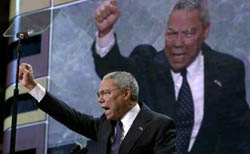
Jeff Jacoby
http://www.jewishworldreview.com -- GEORGE W. BUSH has made it all but official that - assuming he becomes president - Colin Powell will be his nominee for secretary of state. It is a nomination sure to generate much applause. Herewith a dissent.
In many ways, of course, Powell would be an admirable addition to any president's Cabinet. By all accounts he is a man of fine character. His reputation could hardly be more lustrous. When he considered running for president himself five years ago, both parties vied for his favor. He is dignified, tough, patriotic, and - not a small thing after two terms of Bill Clinton - manifestly an adult.
But would he make a good secretary of state?
Bush, it is clear, has no more of ''the vision thing'' than his father did; when it comes to foreign affairs, he has even less. More than most presidents, he will depend on his secretary of state for insight into international developments and for guidance in setting America's course in the world.
After the irresolution of the Christopher-Albright years, the next secretary of state must be someone who is not uneasy with the assertion of US leadership or nervous about the projection of power abroad. Bush's senior Cabinet official will need to assist him in making hard decisions - even unpopular or dangerous ones, if that is what the national interest and the pursuit of world peace require. He will have to be unshakable when it comes to first principles and able to recognize at once when they are threatened.
And when the United States has to rally reluctant allies or face down menacing foes, the incoming secretary of state will need the skill to make America's case, as Thomas Jefferson once put it, ''in terms so plain as to command their assent.''
That is not a job description Powell can meet. He has many terrific qualities, but strategic vision and innovation have never been among them. He is a company man who plays by the rules - the company in his case being the Army, in which he spent nearly all his adult life. He is a classic consensus-seeker, a cautious insider who rarely moves until he knows that everyone is on board. Thinking ''outside the box'' is not a Powell trademark; his instinct is always for the status quo, and time and again it has occluded his judgment.
No chapter in Powell's life illustrates the problem better, ironically, than the one that made his reputation: the Gulf War.
 |
| Powell |
To this day he is routinely described as a ''hero'' of that war, and yet if his advice had been followed when the crisis with Iraq erupted, the result would have been disaster.
When Saddam Hussein invaded Kuwait in August 1990, Powell was prepared to let him keep it. As Michael Gordon and retired General Bernard Trainor reported in ''The Generals' War,'' their detailed account of the war in the Gulf, Powell was adamant that Kuwait was not worth fighting for. ''The American people do not want their young dying for $1.50-a-gallon oil,'' he insisted to then-Defense Secretary Dick Cheney. ''We can't make a case for losing lives for Kuwait.'' Only if Saddam attacked Saudi Arabia did Powell think America should act. When President Bush bluntly vowed that Saddam's aggression would be rolled back - ''This will not stand'' - Powell was dismayed.
Even when the decision was made to confront Iraq, Powell opposed the use of military force. He was convinced, he told Britain's air chief marshal in October 1990, that economic sanctions would bring Saddam around, and he was willing to wait 12 to 15 months, and maybe as long as two years, for them to work. In Powell's view, wrote Gordon and Trainor, ''war with Iraq ... would be politically damaging to Western interests in the Middle East.''
And as soon as Iraqi forces were out of Kuwait, Powell called for ending the war at once. Saddam's Republican Guard was allowed to escape - and then to brutally cut down the countless Iraqis who rose up in desperation to topple the dictator.
This reluctance to act in the face of Saddam's aggression was not an uncharacteristic lapse. Powell has repeatedly counseled passivity and nonintervention.
During the Reagan administration, he was against arming the Afghan rebels with Stinger missiles - weapons that would prove critical in driving out the Soviet occupiers and beginning the end of the Cold War. In 1989, he opposed the use of US troops to help Panamanian rebels depose strongman Manuel Noriega. The result was that the coup failed, resulting in a massive and costly invasion 10 weeks later.
And as Serb killers were slaughtering Bosnians by the tens of thousands, Powell rejected any American use of force to stop the bloodshed - or even, at first, to airlift food to civilians. ''When the fighting broke out, should the West have intervened militarily?'' he asked in 1995. ''Nobody really thinks it has a vital interest.''
A US general who cannot discern a vital Western interest in stopping genocide in the heart of Europe is not the man to run the State Department.
Once the crucial decision to act has been made and a leader is needed to carry it out, Powell is superb. But to make that decision - especially in the absence of strong public support - takes vision, boldness, and clear strategic judgment. Powell's gifts are many, but those are not among
Jeff Jacoby is a Boston Globe columnist. Comment on this column by clicking here.
12/05/00 The 'MCAS' teens give each other
12/01/00 Turning his back on the Vietnamese -- again
11/23/00 Why were the Pilgrims thankful?
11/21/00 The fruit of this 'peace process' is war
11/13/00 Unleashing the lawyers
11/17/00 Gore's mark on history
40 reasons to say NO to Gore
